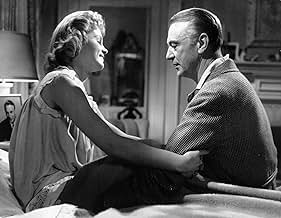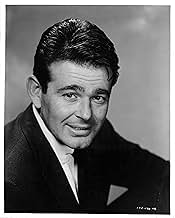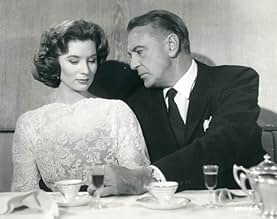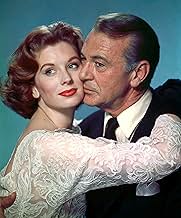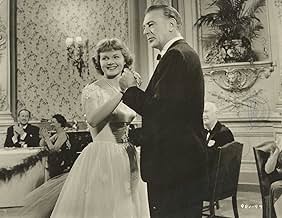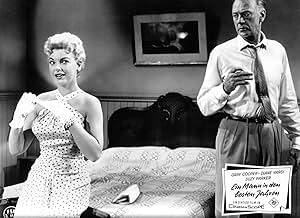IMDb RATING
6.7/10
948
YOUR RATING
Following her father's funeral, Ann reflects on his final years marked by political decline, an unhappy marriage, and drinking only to discover he had experienced one secret period of joy an... Read allFollowing her father's funeral, Ann reflects on his final years marked by political decline, an unhappy marriage, and drinking only to discover he had experienced one secret period of joy and romance.Following her father's funeral, Ann reflects on his final years marked by political decline, an unhappy marriage, and drinking only to discover he had experienced one secret period of joy and romance.
- Awards
- 1 win & 1 nomination total
Robert Adler
- Farmer
- (uncredited)
- …
John Alban
- Dinner Guest
- (uncredited)
Brandon Beach
- Dinner Guest
- (uncredited)
Melinda Byron
- Hope
- (uncredited)
Mary Carroll
- Nurse
- (uncredited)
Beulah Christian
- Nightclub Patron
- (uncredited)
Buck Class
- Bill
- (uncredited)
- Director
- Writers
- All cast & crew
- Production, box office & more at IMDbPro
Featured reviews
Gary Cooper plays Joe Chapin, a very successful man turning fifty years old, prodded into state politics by his nagging wife, played by Geraldine Fitzgerald. Chapin shuns the political scene when he finds it going against the standards and principles he lives by. His wife soon makes him feel a loser and he finds solace in the arms of his daughter's roommate, half his age.
Romantic and consuming; from the pen of Philip Dunne. This is an over looked drama shot in black and white. Daughter Ann is played by Diane Varsi and her roommate Kate is played by the lovely Suzy Parker. Also in the cast are Stuart Whitman and Ray Sticklyn.
Romantic and consuming; from the pen of Philip Dunne. This is an over looked drama shot in black and white. Daughter Ann is played by Diane Varsi and her roommate Kate is played by the lovely Suzy Parker. Also in the cast are Stuart Whitman and Ray Sticklyn.
John O'Hara's book TEN NORTH FREDERICK was hardly the masterpiece of political life, but it had strong characterizations, and the film, also not a masterwork, has a lot more going for it than we initially thought. Still of major consequence are the performances of the supporting players. In this tale of a failed political hopeful, his vengeful wife, his youngish girlfriend, and assorted other characters, the viewer is caught by the superb work of the cast. All seems possible with the effective work. Geraldine Fitzgerald, as always, is a total marvel -- one of the finest of three decades. She should be almost deified. In this, she eschews her sensitive side to superbly capture the nastiness of a woman who want more and more... with less change to get it. But she is matched by young Ray Stricklyn as the confused young son... with at least one scene that should have done for him what the telephone scene in The Great Ziefgeld did for Luise Rainer. His work indicates the hope we all had for him.... but he correctly went to the L.A. stage where he scored enormous successes. Diane Varsi and Stuart Whitman both underscore the acting skills we first saw in them. The love story between the older Gary Cooper and the younger Suzy Parker works better than I had recalled. He tries with his expected skill to show the desperation of the man, but Suzy Parker DOES offer a multi-layered performance -- far superior to the work she had done in other films. This film remains an interesting Hollywood look at the world of politics, and it should not be buried unmarked in the annals of solid craftmanship.
John O'Hara's best selling novel, described by one critic as 'a brilliant portrait of the personal and political hypocrisy of mid-century America', has been adapted by one of cinema's finest screenplay writers Philip Dunne who also capably directs although he himself admitted that he had 'started directing too late'. Albeit truncated, this version apparently met with the approval of the author.
The political ambitions of leading character Joseph Chapin in the novel have been reduced here and Dunne has opted to develop a brief fling between middle-aged Chapin and Kate Drummond, a woman half his age, into a full blown romance. It must be said that the beautifully understated and sensitive playing of Gary Gooper and lovely Suzy Parker has resulted in one of the most moving and heartbreaking Spring/Autumn affairs ever committed to celluloid.
By all accounts Mr. Cooper jumped at the chance to play the part originally turned down by Spencer Tracy and would no doubt have identified with his character as he had earlier called off his relationship with Patricia Neal and returned to his wife who was hopefully more forgiving that his spouse in this, played by the superlative Geraldine Fitzgerald. There were also distinct echoes of Diane Varsi's own life in her role of Chapin's daughter, having come from a broken home and been twice divorced by the age of twenty one. This talented but fragile artiste suffered a breakdown during filming and was later to quit Fox studios as she felt she was 'heading for destruction'.
Great support from John Emery, Philip Ober, the ill-fated Tom Tully and the inimitable Barbara Nicholls as a party girl. There is a splendid score by Leigh Harline but the confounded Cinemascope format alas proves itself once again totally unsuited to intimacy. The phrase 'they don't make them like that anymore' is used to describe the character of Joe Chapin. It might just as easily refer to Gary Cooper.
The disillusionment, regret and sense of failure depicted here cannot fail to strike a chord with most of us and call to mind Whittier's 'Of all the sad words of tongue or pen, the saddest are these: it might have been.'
The political ambitions of leading character Joseph Chapin in the novel have been reduced here and Dunne has opted to develop a brief fling between middle-aged Chapin and Kate Drummond, a woman half his age, into a full blown romance. It must be said that the beautifully understated and sensitive playing of Gary Gooper and lovely Suzy Parker has resulted in one of the most moving and heartbreaking Spring/Autumn affairs ever committed to celluloid.
By all accounts Mr. Cooper jumped at the chance to play the part originally turned down by Spencer Tracy and would no doubt have identified with his character as he had earlier called off his relationship with Patricia Neal and returned to his wife who was hopefully more forgiving that his spouse in this, played by the superlative Geraldine Fitzgerald. There were also distinct echoes of Diane Varsi's own life in her role of Chapin's daughter, having come from a broken home and been twice divorced by the age of twenty one. This talented but fragile artiste suffered a breakdown during filming and was later to quit Fox studios as she felt she was 'heading for destruction'.
Great support from John Emery, Philip Ober, the ill-fated Tom Tully and the inimitable Barbara Nicholls as a party girl. There is a splendid score by Leigh Harline but the confounded Cinemascope format alas proves itself once again totally unsuited to intimacy. The phrase 'they don't make them like that anymore' is used to describe the character of Joe Chapin. It might just as easily refer to Gary Cooper.
The disillusionment, regret and sense of failure depicted here cannot fail to strike a chord with most of us and call to mind Whittier's 'Of all the sad words of tongue or pen, the saddest are these: it might have been.'
John O'Hara whose Pal Joey was brought to the screen the year before wrote the book Ten North Frederick on which this film is based. For some reason this is a film of Gary Cooper's that is rarely shown any more.
Cooper is the WASP type upper crust patrician who has some political ambition. He's a well respected man in his area, except apparently in his own home.
He's married to a woman who makes Lady MacBeth look like Mary Poppins. Geraldine Fitzgerald steals the acting honors in this film with her portrayal as the exponential shrew of a wife. Though I haven't seen Ten North Frederick in years, it's Fitzgerald's performance that has stayed with me and I suspect will stay with you if the film is ever going to see the light of day.
Diane Varsi and Ray Stricklyn are the rebellious kids in the household who can't quite figure out all the hostility there, but they not something is radically wrong. Suzy Parker plays Varsi's friend with whom Cooper has a midlife crisis affair with. Believe me when you see Fitzgerald in this film, you won't blame Cooper in the slightest.
Ten North Frederick set the standard for John O'Hara type soap operas and I'm surprised no one picked up on this one. With some updating this could easily be a plot for a prime time soap opera pilot.
Cooper is the WASP type upper crust patrician who has some political ambition. He's a well respected man in his area, except apparently in his own home.
He's married to a woman who makes Lady MacBeth look like Mary Poppins. Geraldine Fitzgerald steals the acting honors in this film with her portrayal as the exponential shrew of a wife. Though I haven't seen Ten North Frederick in years, it's Fitzgerald's performance that has stayed with me and I suspect will stay with you if the film is ever going to see the light of day.
Diane Varsi and Ray Stricklyn are the rebellious kids in the household who can't quite figure out all the hostility there, but they not something is radically wrong. Suzy Parker plays Varsi's friend with whom Cooper has a midlife crisis affair with. Believe me when you see Fitzgerald in this film, you won't blame Cooper in the slightest.
Ten North Frederick set the standard for John O'Hara type soap operas and I'm surprised no one picked up on this one. With some updating this could easily be a plot for a prime time soap opera pilot.
A successful small-town lawyer (Gary Cooper) with a beautiful wife (Geraldine Fitzgerald), two over-achieving children, and aspirations to be president, seems to have it all. But as his daughter looks back on his life, a different man emerges: one in conflict with his ambitious and shrewish wife, terrified that the misdeeds of his children will dash his political dreams, and in love with a model half his age (Suzy Parker). With black wit and penetrating insight, as a portrait of the personal and political hypocrisy of mid-20th-century America Ten North Frederick stands much above Butterfield 8, Revolutionary Road, Mr. Bridge and Mrs. Bridge, though much beneath The Swimmer and Mad Men. Pretty competent drama extracted from John O'Hara. Certainly half-flawed. There is, for example, a flashback in which the character who remembers could not have previous knowledge of the remembered facts, which only the viewer knows.
Did you know
- TriviaSpencer Tracy was originally cast in the lead role, but withdrew due to ill health and concerns over the ability of co-star Suzy Parker. Tracy told reporters in November 1957 he had withdrawn from this film to star in La dernière fanfare (1958).
- GoofsIn the opening sequence, which is supposed to be taking place in 1945, a 1950 Lincoln Cosmopolitan prominently pulls up in front of the house.
- Quotes
Stella: You're hurtin' my arm.
Joseph B. 'Joe' Chapin: I frequently hurt people without meaning to. It's my specialty.
- ConnectionsFeatured in Les années rebelles (1997)
- SoundtracksOn the Atchison, Topeka and the Santa Fe
(uncredited)
Music by Harry Warren
Played on the phonograph in Joby's room
Details
- Release date
- Country of origin
- Language
- Also known as
- Ten North Frederick
- Filming locations
- Production company
- See more company credits at IMDbPro
- Runtime
- 1h 42m(102 min)
- Color
- Sound mix
- Aspect ratio
- 2.35 : 1
Contribute to this page
Suggest an edit or add missing content

